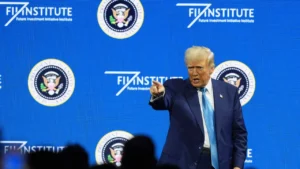Restorative justice in NYC schools put to test

Restorative justice has been put to test in New York City schools. This is all thanks to an influx of federal dollars, more than tripling funding over a three-year period to $21.6 million next fiscal year, according to the Independent Budget Office.
The current administration’s plans are less clear.
The restorative justice funding remains in the budget and schools Chancellor David Banks recently said he does not favor zero tolerance approaches.
However, education department officials declined interview requests and did not respond to written questions about their plans, including whether they’re moving forward with expanding restorative justice programming to all middle and high schools.
Manhattan’s Harvest Collegiate High School is one of hundreds of schools across New York City that have embraced restorative justice, a philosophy rooted in giving students and staff space to share their feelings and talk through conflicts instead of resorting to more punitive measures like suspensions.
Many school leaders leaned on those tools this year, the first since March 2020 requiring the return of all students — many of them bearing deep emotional and academic scars.
Some students were withdrawn and depressed while others acted out as they reacclimated to in-person classes. But even schools that prided themselves on using restorative justice to address students’ needs struggled to pick up where they left off before the pandemic.
On some campuses, including Harvest, leaders continued to emphasize restorative justice by devoting more staff resources to it, restarting student-led mediation, and giving students regular opportunities to reflect on everything from their anxieties about grades to the mass shooting in Uvalde, Texas.
But other school leaders struggled with how to address disruptive behavior when programming like mentorship or advisory programs had atrophied, sometimes backsliding to more punitive forms of discipline.
“Things have been more challenging this year by several orders of magnitude,” said Tala Manassah, the deputy executive director at the Morningside Center for Teaching Social Responsibility, which helps implement restorative justice programming at hundreds of schools, including in New York City.
“The pain that kids are coming to school with I think is unprecedented.”







